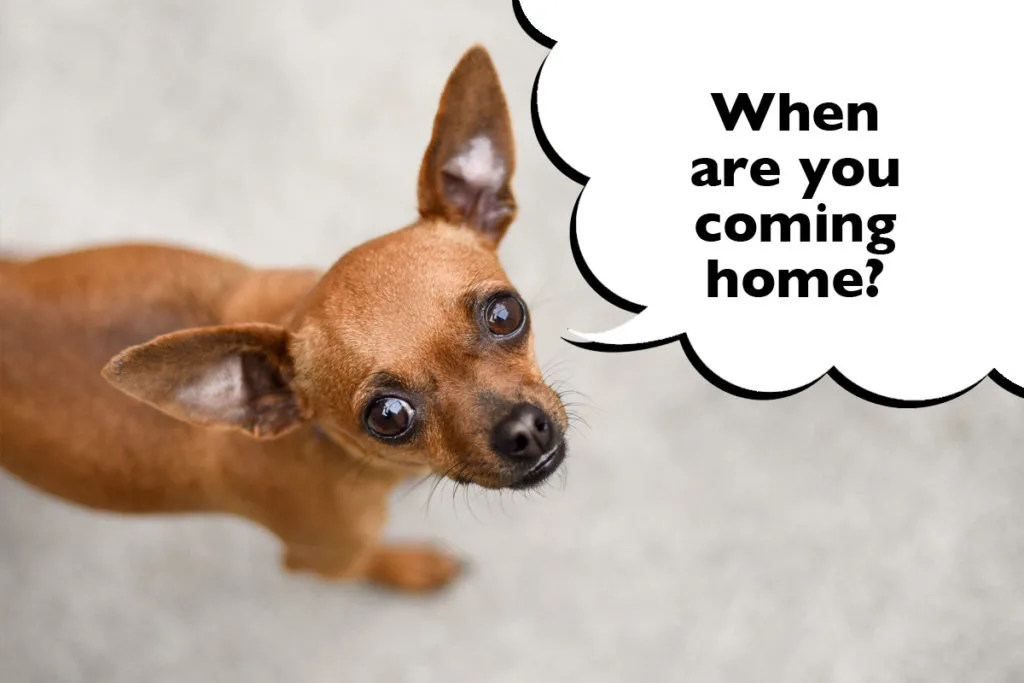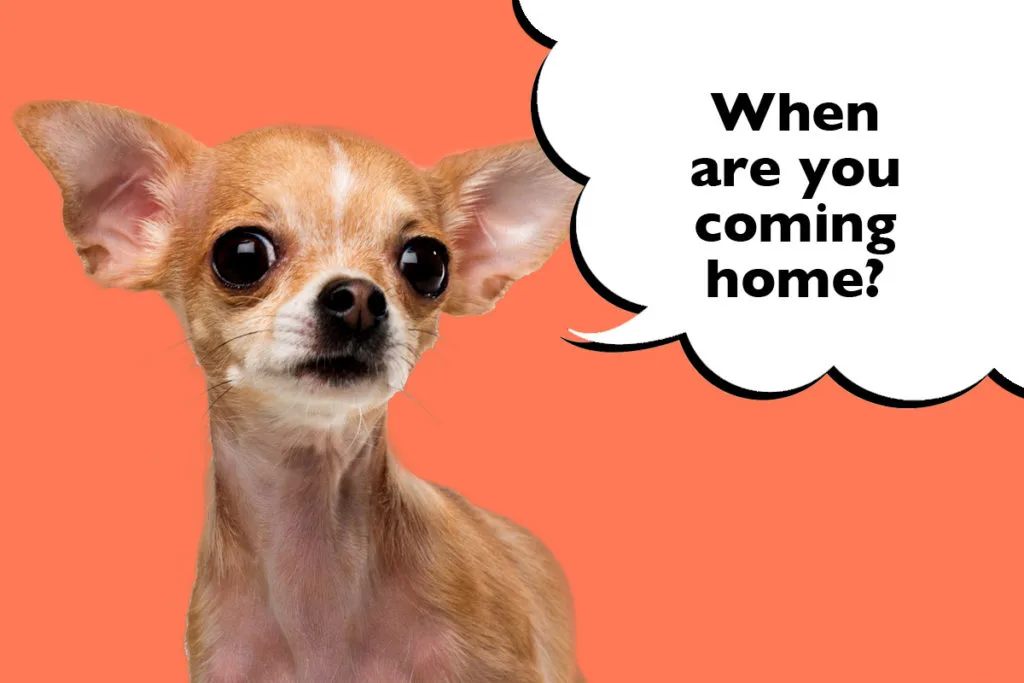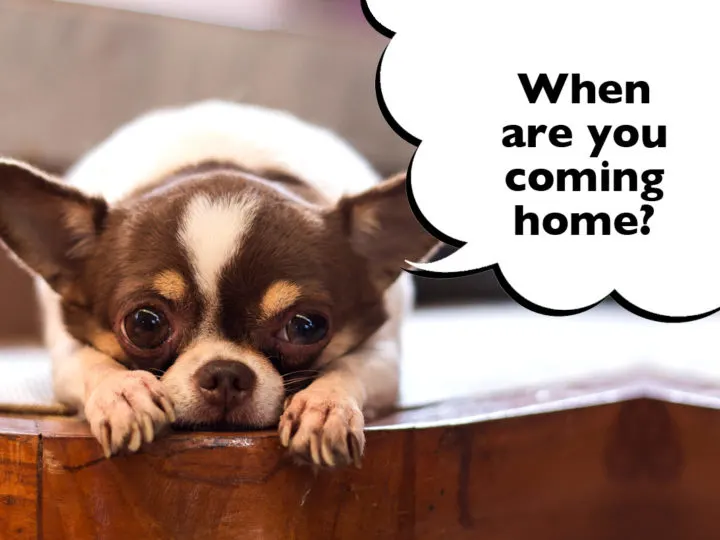Do you have a Chihuahua that’s struggling to cope when you leave the house? Maybe you’re wondering how to deal with your Chihuahuas separation anxiety? Here’s everything you need to know about whether Chihuahuas get separation anxiety.
Do Chihuahuas Get Separation Anxiety? Yes, Chihuahuas commonly suffer from separation anxiety. Being the smallest of all the dog breeds, they’ve got a reputation for being loving lap dogs. Because they’re often so attached to their owners, it can make it very difficult for them to be left alone.
Read on to find out how Chihuahuas show signs of separation anxiety, how they behave when you leave and come back home, and what you can do to treat your Chihuahuas separation anxiety!
Never use the advice in this article as a substitute for professional veterinary advice or treatment. I am NOT a Vet, qualified dog trainer or dog behaviourist. This article is based on research, personal opinion and experience of owning dogs over the last 12+ years.
What Is Separation Anxiety In Chihuahuas?
Chihuahuas have been bred since the early 1900s as companion dogs and are still hugely popular today.
As lap dogs that tend to get picked up and cuddled a lot, they can get overly attached to their owners.
This can sadly lead to separation anxiety symptoms when they’re left on their own.
However, with careful and consistent dog training, you can help your Chihuahua to overcome their fears.
In fact, if your Chihuahua is still a puppy, you can work with them to reduce the chance of them developing separation anxiety in the first place!
What Are The Signs Of Separation Anxiety For Chihuahuas?
The severity of separation anxiety can vary between individual Chihuahuas.
However, if your Chihuahua shows any of these signs when they’re away from you, they could be suffering from separation anxiety:
- Pacing around the room
- Seeming unable to settle
- Seeming or looking depressed
- Lying in their bed for long periods without sleeping
- Chewing furniture or other items
- Howling or crying
- Barking excessively
- Weeing or pooing in the house
- Coprophagia (eating their own poo)
- Trying to escape from a crate or the room they’re in
- Panting and drooling
- Attention seeking before you leave them
- Hyperactivity when you return to them
It can be difficult to tell if your Chihuahua has separation anxiety or a different behavioural problem.
So, you also need to look out for signs before you leave home, when your Chihuahua is alone and then when you return too.
This is what you need to look out for:
Signs To Look Out For Before You Leave
Your Chihuahua may show signs of anxiety if they think you’re about to leave them alone.
Simple things like picking up your keys or putting on your coat can trigger a reaction. They may start whining or become visibly stressed.
Signs such as yawning, licking their lips and drooling more, point towards them feeling uncomfortable with what’s about to happen.
Your Chihuahua may also start showing attention-seeking behaviours like bringing you a toy to play with, or jumping up at your leg, to delay you from leaving the house.
Signs To Look Out For When You’re Away
It can be a good idea to get a camera to keep an eye on your Chihuahua when they’re home alone.
Furbo cameras are excellent for this, as they pick up sounds too. This can let you know what they’re up to and can also detect if they’re barking when you’re not there.
Look to see if your Chihuahua is chewing on your furniture or destroying anything else. Even shredding their own toys can be a sign of separation anxiety.
They may start pacing around the room, looking unsettled or scratching at doors or walls to try and escape.
If you have neighbours, you can also ask them to listen out and let you know if your Chihuahua is barking when you go out.
Signs To Look Out For When You Return
Even after you get home, it’s likely your Chihuahua will still be feeling anxious. In fact, it can take a while for them to calm down again.
They might appear over-excited or hyperactive when they’re greeting you. This can happen even if you’ve only been gone for a very short amount of time.
If they’ve been chewing or scratching at something, they may have injured themselves in the process. So check their nose, teeth, mouth and paws in case they’ve hurt themselves when trying to escape.
There may be obvious evidence that your Chihuahua has done a wee or poo in the house. However, they might have eaten their own poo, even if this isn’t something they normally do.
If you’ve left treats or food out for your Chihuahua, they’ll likely be too stressed to eat them until you return home. If they suddenly start to eat them once you’re back, this may mean they’ve got separation anxiety.

How Can I Treat My Chihuahua’s Separation Anxiety?
If your Chihuahua has separation anxiety, there are some things that can help them overcome it:
Do Some Desensitisation Training With Your Chihuahua
Picking up your keys, or putting on your shoes can be enough to trigger your Chihuahua’s anxiety.
But, the good news is, desensitisation training can help then feel differently about you getting ready to leave the house.
So start by doing your usual leaving routine. For example, pick up your keys, put on your shoes, grab your bag and anything else you normally take with you.
Then quietly sit down to watch TV for 10 minutes, or listen to a short podcast. Reward your Chihuahua for staying calm and not getting stressed out.
Keep doing this several times a day until they seem less bothered about you getting ready to go out.
Next, repeat the leaving routine but go into a different room for a few minutes. For example, go to the kitchen to make a drink or sit in the lounge with a magazine.
Return to your Chihuahua after a few minutes and reward them with a tasty treat for staying calm.
Slowly build up the time you stay out of the room over the next week or so.
Once you’re sure your Chihuahua’s happy with this, you can start leaving the house for a few minutes. For example, go out into the garden or sit in your car for 5 minutes before going back inside.
Repeat this several times a day, gradually increasing the time you’re away from them during each training session.
In time, they’ll soon realise that it’s nothing to worry about when you pick up your keys and leave the house. You’ll basically train then that you’ll always come home!
This process is one of the best things you can do to treat separation anxiety, and it sets your Chihuahua up for success, instead of waiting for them to fail.
It does take a lot of patience, commitment and time for this training to work or be successful, but it’s worth it in the long run!
Leave The TV Or Radio On For Your Chihuahua
Leaving your Chihuahua with some background noise can help them feel a little less lonely too. This is especially useful if your home is usually busy with lots going on.
Going from a hectic household with kids running around to total silence when your Chihuahua is home alone, can be daunting for them.
Classical music tends to be a good choice because it’s proven to be the most relaxing for dogs to listen to.
Give Your Chihuahua Something That Smells Like You
Chihuahuas form particularly strong bonds with their owners. So, giving them something that has your scent on can be reassuring for them.
So, if it’s safe to do so, leave an item of your clothing like an old t-shirt in their bed so they feel closer to you when you’re not there.
Just be sure not to leave anything that could cause them any harm.
Get A Heartbeat Comforter For Your Chihuahua
Some Chihuahuas find it comforting to have a heartbeat comforter toy to lie with.
These are basically cuddly toys for dogs that contain a device that mimics the feeling of a heartbeat.
This can help your Chihuahua feel less lonely as it gives the illusion of another living creature being close to them.
Give Your Chihuahua A Comfortable Bed
Chihuahuas love their home comforts, so it’s important they’ve got somewhere comfortable to rest when they’re home alone.
A plush comfy bed and fleecy blankets are usually a good choice.
Some Chihuahuas like the security of a crate, covered in a blanket. But, it’s best to leave the crate door open so they have the option to come out if they want to.
Because they’re so tiny, you can even get away with getting them an igloo type bed, which are more commonly used for cats.
These are comfortable and make them feel secure too.

Keep Calm When You Leave Your Chihuahua
Your Chihuahua will notice exactly how you’re feeling. If you’re anxious or stressed about leaving them, it’s likely to worsen their separation anxiety.
So, you need to be calm and relaxed about the whole thing! Act as if it’s no big deal, so your Chihuahua doesn’t think there’s anything to worry about when you need to go out.
Don’t Leave Your Chihuahua For Too Long
Even if your Chihuahua’s separation anxiety is only minor, they still need regular breaks.
If you can help it, never leave them alone for longer than 4 hours at a time. Chihuahuas thrive on human company, so they’ll quickly get lonely and will need to potty too!
If you need to be away from home for longer than this, consider a dog walker or daycare service or get friends or family to help you out.
Make Sure Your Chihuahuas Getting Enough Exercise
Adult Chihuahuas need a recommended 30 minutes of exercise each day plus plenty of playtime too.
Without this, they can get frustrated and have too much energy. This can make it harder for them to settle down when left alone.
You can see why they’d quickly get bored being left alone all day, if the haven’t had enough exercise!
So take them out for a walk before leaving them, to tire them out and let them go potty. You don’t have to go too far.
Encourage them to sniff and explore, as this is relaxing for them and provides mental stimulation too.
Keep A Set Routine When Leaving Your Chihuahua
Try to leave your Chihuahua at the same time each day, so they know what to expect. This can be reassuring for them, as they’ll soon figure out you’ll always come home.
Leaving them frequently for short periods is a better alternative to leaving them for a long time all in one go.
Use A Camera To See What Your Chihuahua’s Up To
A camera lets you see and hear what your Chihuahua is getting up to when you’re away from them.
Some let you speak to them too, to try and soothe them that everything’s okay.
Being able to see them when you’re not there can help you work out how long your Chihuahua is comfortable being alone, before they start getting restless.
Never Shout At Your Chihuahua For Their Behaviour
Chihuahuas are very sensitive little dogs who can easily be frightened or upset if you shout at them.
Remember, although it may be frustrating for you that they’re behaving this way, they’re not doing it on purpose.
Similar to panic attacks in humans, your Chihuahua’s separation anxiety is outside of their control.
Consider Medications Or Supplements For Your Chihuahua
Many natural remedies and veterinary medications are available that may help your Chihuahua deal with their anxiety in the short term.
Ideally, these shouldn’t be used long term or as a substitute for training though.
Speak to your Vet for advice on the most appropriate medications or supplements for your Chihuahua!
So, there you have it! As small dogs that spend a lot of time being picked up or on the lap of their owners, it’s common for Chihuahuas to suffer from separation anxiety when left on their own. However, there are many ways you can work on this and desensitivity training is a great place to start!
What do I do next?
Thank you for reading all the way to the end of this article, your support for my blog means everything to me! If you found this article helpful, please kindly share below. Thank you!

